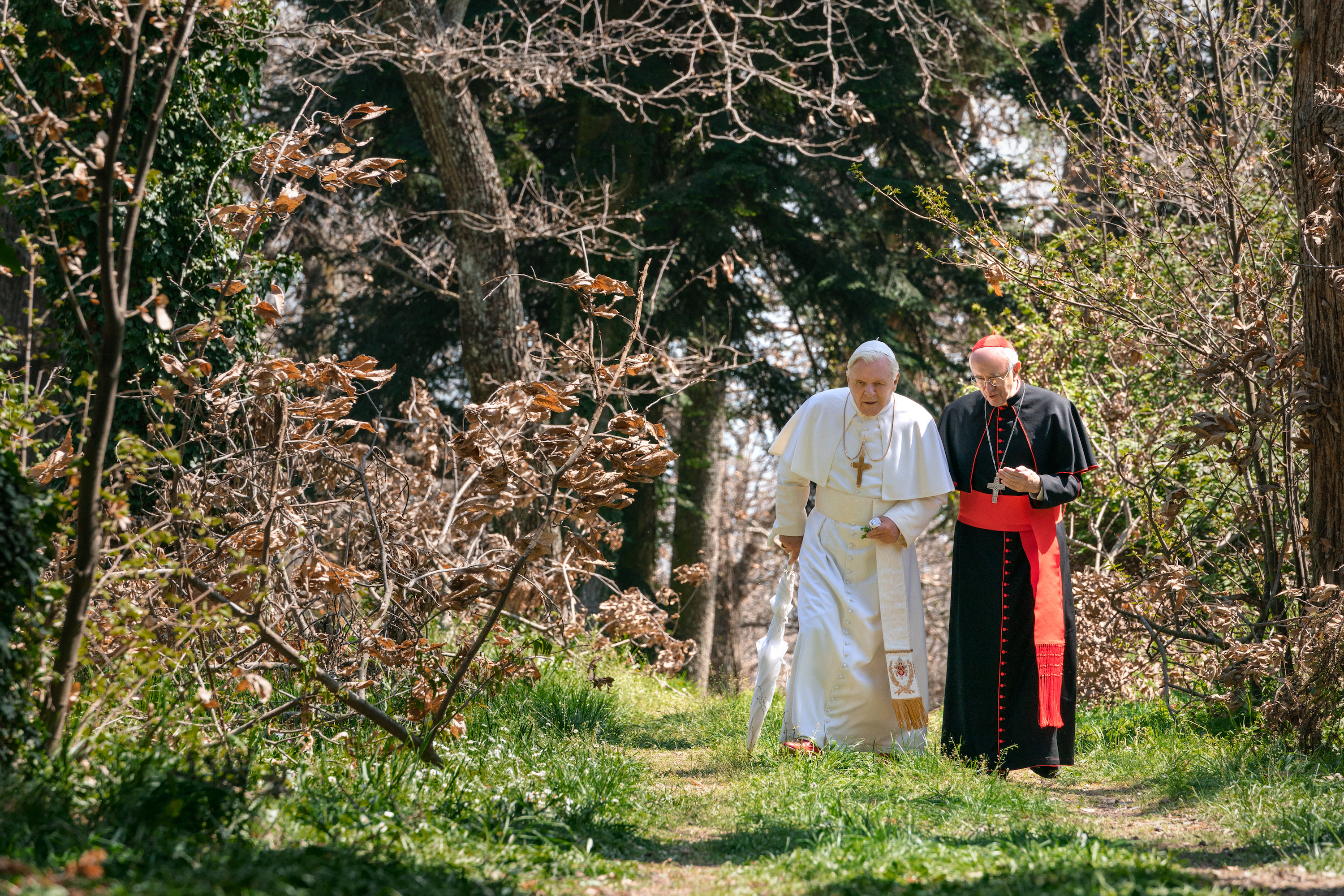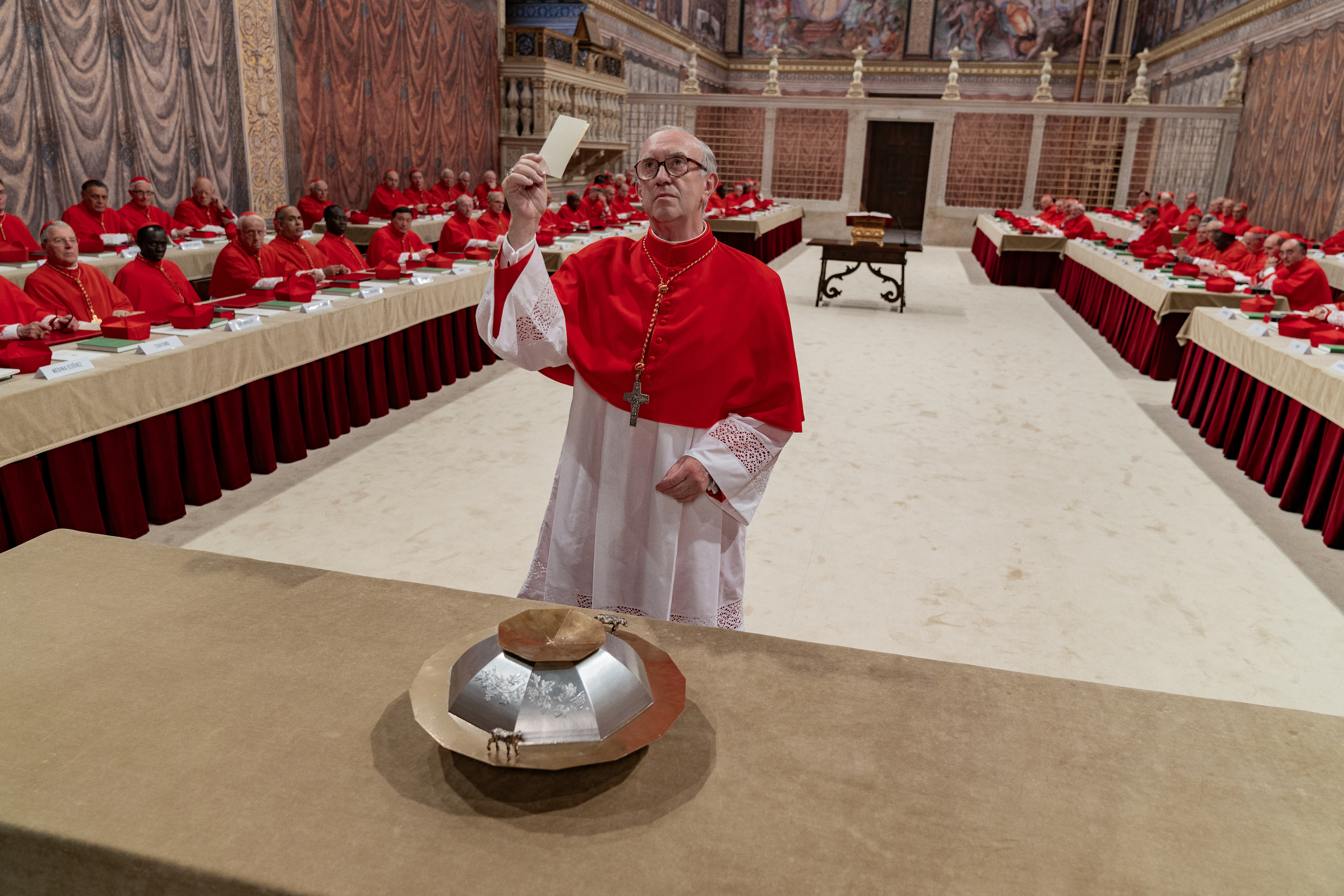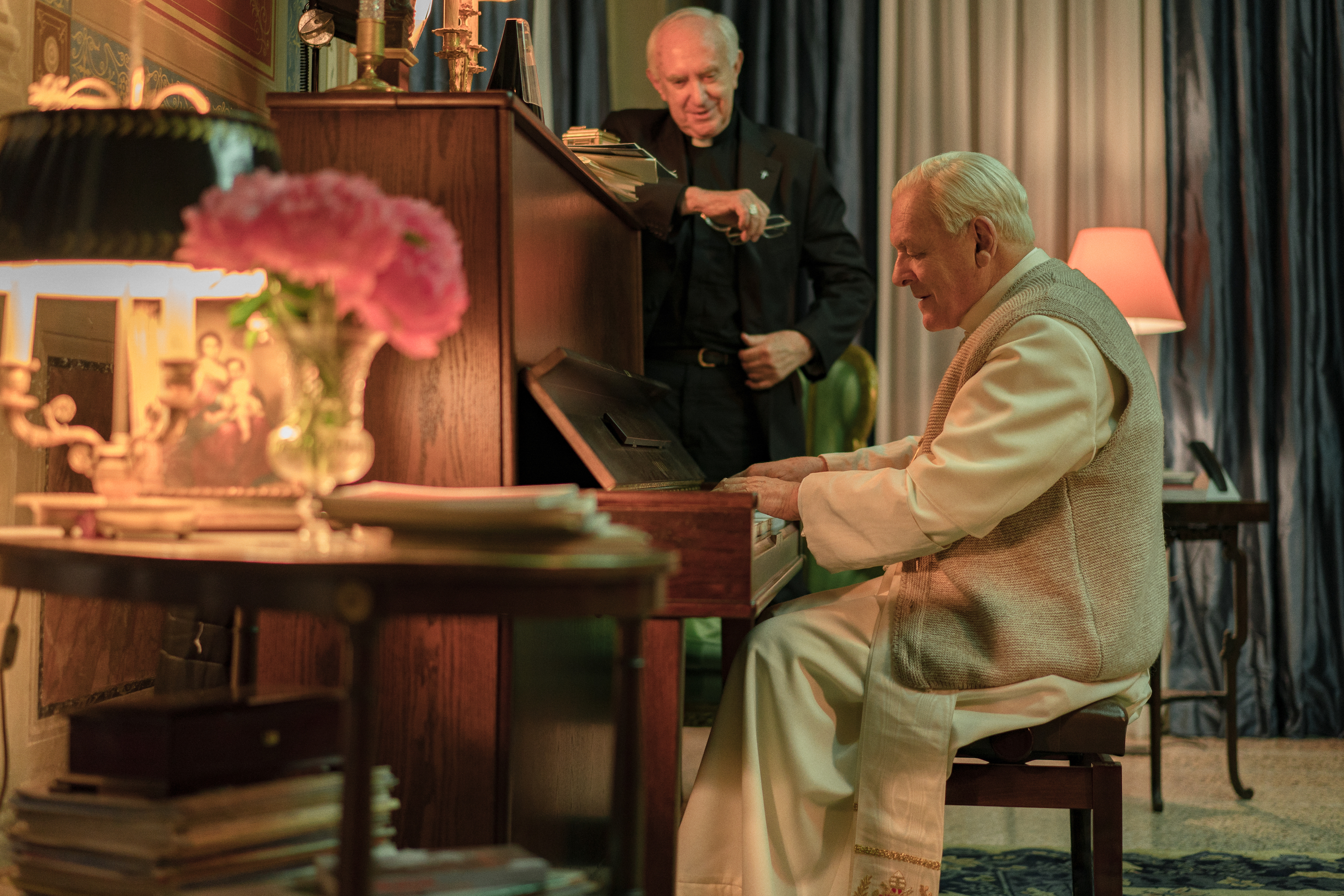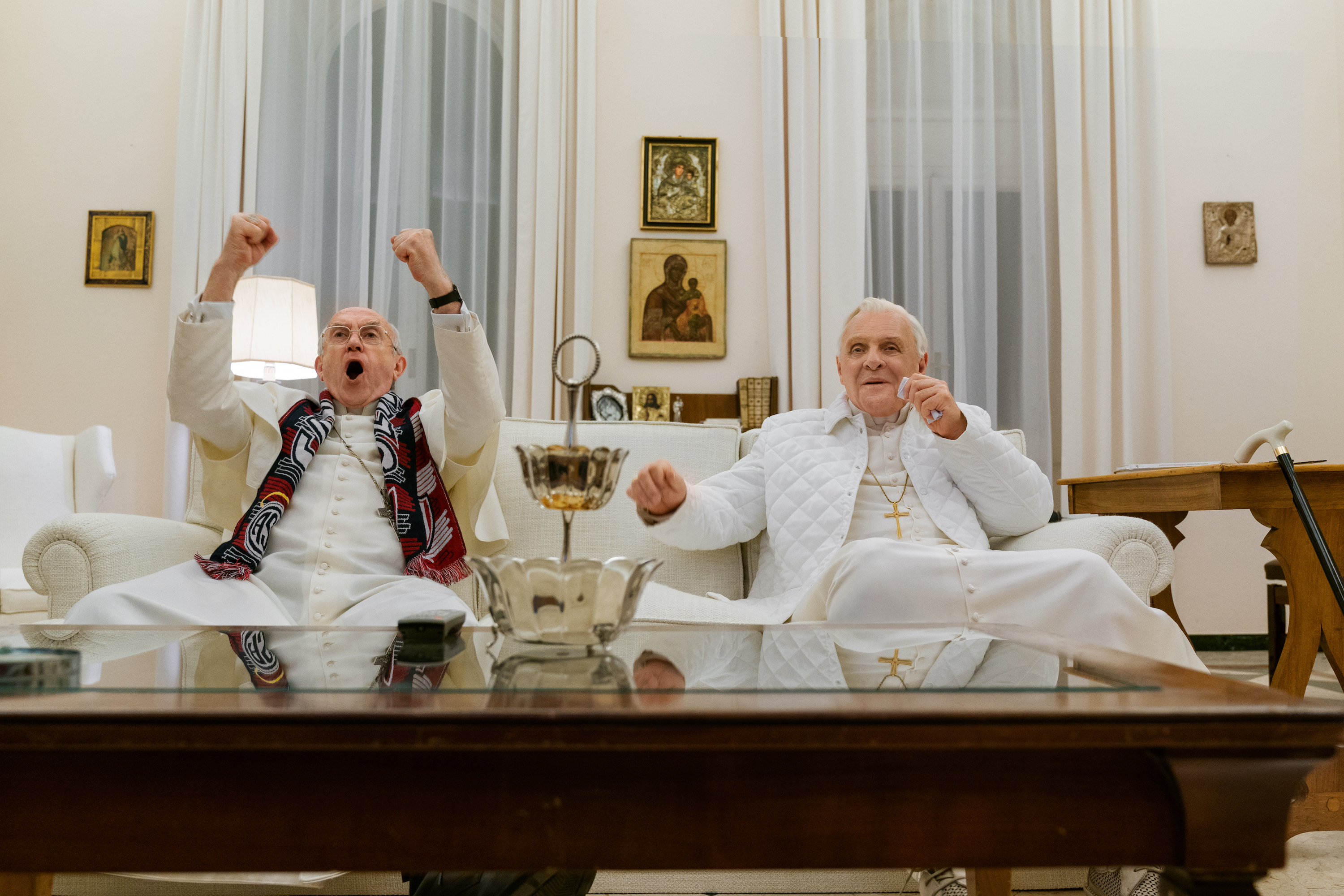
Anthony Hopkins and Jonathan Pryce star in "The Two Popes." (Peter Mountain)
Days after his historic election on March 13, 2013, Cardinal Jorge Mario Bergoglio, now Pope Francis, tries to book a ticket to Lampedusa to visit refugees there, but the booking agent hangs up on him because she thinks he is pretending to be the pope.
The film, "The Two Popes," then flashes back to 2005 to the election of Francis' predecessor, Cardinal Joseph Ratzinger (Anthony Hopkins), following the death of the long-reigning, now canonized Pope John Paul II. It is a contested election and Ratzinger obviously wants the job. He is openly worried when Milan Cardinal Carlo Maria Martini and Bergoglio (Jonathan Pryce) of Buenos Aires, Argentina, receive significant support in early voting. Ratzinger does not try to hide his disdain for the liberation theology-loving Jesuit from Latin America when they walk past each other, even after he is elected and takes the name Benedict XVI.
Now, nine years later, Bergoglio, 75, has just purchased a plane ticket to go to Rome and offer his mandated resignation to Benedict when an overlapping summons calls him to Rome. Benedict is at his summer residence, Castel Gandolfo, and Bergoglio is made to wait to see the pope. As he waits, he makes friends with the gardener. Benedict notices and is not impressed.
Advertisement
As the men walk, Benedict makes comments and asks some questions. He sounds hostile and critical, and Bergoglio is mystified as to why he has been summoned. He tries to hand over his letter of resignation but Benedict refuses to take it. As they walk indoors, Benedict tells Bergoglio, "I disagree with everything you think, say and do. But I think your time has come, Bergoglio." They spend some time together in what seems to be a papal living room. Benedict encourages Bergoglio to watch news of his favorite football team and then plays the piano briefly. Bergoglio recalls the influence of his grandmother, his youth and his vocation story, his decision not to marry and become a Jesuit priest.
Benedict is called to Rome the next morning to respond to a crisis and the two take a helicopter to the Vatican. There, over what seems like a day or two, they continue their conversations. Benedict reminds Bergoglio of his years as provincial of the Jesuit community when two of his fellow Jesuits, Fr. Orlando Yorio and Fr. Franz Jalics (Lisandro Fiks) were kidnapped by the dictatorship's naval authorities during the 1976 "Dirty War." Bergoglio tells his side of the story with flashbacks to his exile to a mountain parish in Córdoba afterward. It is obvious that Bergoglio feels responsibility and sorrow even though he is innocent of complicity in the kidnapping and torture of the priests and he helped many Argentinians escape during those years. He kneels and Benedict offers absolution.
The next morning, Benedict asks to meet Bergoglio in the Sistine Chapel before it opens to the public. Now it is Benedict's turn to mention his role in the church and the papacy and his struggle to hear the voice of God. He no longer seems adversarial toward Bergoglio. As they gaze at the ceiling they speak of God's hand in their lives. Bergoglio, who discovered a pizza restaurant near the Vatican, suggests they order in something to eat. They share a pizza and seem almost friendly, both forgetting their worries for a while. After, they talk about the clergy abuse scandal in the "Room of Tears" where newly elected popes go to vest before meeting the crowds at St. Peter's Square. Benedict admits the burdens of the situation beginning with Vatican protections for one of the most criminal abusers, who also had mistresses and fathered children, Fr. Marcial Maciel. It is now Benedict who is the penitent.
It is clear neither one of them wants to continue in their roles. Benedict tells Bergoglio he intends to resign the papacy, that there is precedent, and Bergoglio passionately urges him not to do this, for all kinds of reasons. He also suspects that Benedict sees him as a possible successor.

Cardinal Jorge Mario Bergoglio, played by actor Jonathan Pryce, votes in the 2013 conclave in a scene from "The Two Popes." (Peter Mountain)
Though the film opens with a line that says the story is based on true events, the film is a series of richlyimagined encounters between Pope Benedict XVI and Pope Francis, based on the book by New Zealand author Anthony McCarten, who also scripted the film. He choreographs their conversations in Vatican locations, especially the Sistine Chapel, that was created almost perfectly to scale (except for the ceiling that was added by CGI).
I had the opportunity to visit the set toward the end of filming in May 2018 (along with my NCR colleague, Vatican correspondent Joshua McElwee). We walked inside the "Sistine Chapel" in the sound set at Cinecittà Studioson the outskirts of Rome. We had lunch with the director, Fernando Meirelles and met Jonathan Pryce as we toured the sets. It is always an education to do a set visit during film production; you come to appreciate all the work that goes into making cinema as well deepen your understanding of how media is constructed, piece by piece, moment by moment, image by image. We saw the large sewing room (and met some of the sewers) where the costumes for the many cardinals were accurately designed and made. The many red socks (and shoes!) and other articles of clothing were donated to refugee camps in Italy after the filming.
If McCarten is interested in the clergy abuse scandals, the images of Latin America's crowded favelas and Argentina's civil unrest reflect the sensibilities of Brazilian director Meirelles who directed the gritty "City of God." Music plays a significant role in the film; we get Abba and the tango with Bergoglio and more dated and classical music for Benedict.
The performances are exceptional and award worthy. Hopkins as Benedict, the pope whom we seem to know less about, is very good at externalizing dimensions that can only be imagined of a pope who dared to resign. Francis and Benedict are formidable opposites and opponents. Watching the two popes portrayed by Pryce and Hopkins as they watch the 2014 soccer match between Germany and Argentina is priceless. Humor is good for the soul and for a film about, of all things, two popes living at the same time within the same square mile; it keeps the audience grounded. After an AFI screening in Hollywood, Ben Cahlamer, a film critic who attended the reception as I did, said of the film that, "The heavens opened, and they laughed with us." A priest at the same screening told me that "it was a lot of fun."

Jonathan Pryce and Anthony Hopkins star in "The Two Popes." (Peter Mountain)
I met a woman at the reception who showed me the small scapular she wears and said, "This film made me want to spend more time on my spiritual life." Another said that she doesn't care to go to confession very often, or at her parish where the priest knows her, but seeing the popes go to confession with one another helped her understand the sacrament and forgiveness better.
Oscar-winning filmmaker Chris Donahue told me why he's telling people it's a comedy. "The great thing about the film is not that it's a theological treatise, but the story of hope and an unlikely friendship." Donahue sees it as a modern Divine Comedy where each pope experiences inferno, purgatorio and finally, paradiso."
Personally, I will use this film for our cinema divina retreats. I can see it in RCIA programs as well because though it is fiction, it deals with church history, the papacy, mysteries of faith and offers much to talk about. It also has something to say about the antagonistic level of public discourse in the U.S.
Along with my colleague, Pauline Sr. Nancy Usselmann, I also had the opportunity to interview McCarten who wrote the 2017 play "The Pope" and the 2019 book The Pope: Francis, Benedict and the Decision that Shook the World. He commented on how many "audience awards" the film is winning at film festivals, and that he doesn't want to exaggerate it, but thinks this is because the film is about "a universal need for tolerance, for listening to each other, understanding, compromise, communion."
McCarten was in Rome with his wife, Eva, in 2013 when they visited St. Peter's Basilica to light a candle for a friend. But the square was filled with people for a Mass celebrated by Francis. He wondered where Benedict was now, and what was it like for there to be two popes. What made him resign? I didn't know the answer, so we googled it, and realized that Pope Celestine I resigned in 1294. Dante included him in the Divine Comedy (completed 1320) and put him in the bottom of hell, calling him "the great refuser."
McCarten continued, "I began wondering why Benedict resigned. It was a cataclysmic event and caused an ecclesiastical conundrum: what do you do with two popes at the same time? I always start from a state of curious ignorance. I write what I want to know." He spoke about the scene where the two men, who have exhausted each other, sit in silence as brothers and just say nothing. "Silence," McCarten said, "allows for tolerance, for understanding."
"The Two Popes" might be deemed too "talky" or "churchy" and even pedantic if not for the humorous banter that breaks the gravitas of their meetings. Benedict the philosopher is balanced by Francis the pastor. The entire narrative is characterized by the juxtaposition of the two men in their diversity as much as it is a story of unity that unfolds in the images and sounds of 2,000 years of history. It presents a dynamic cycle of perspectives as one man grows to understand the other's experience, spirituality and theology. They have to stretch their northern and southern hemispheric and ecclesial worldviews as they spar in front of the altar in a stunningly beautiful 500-year-old chapel. Dialogue and hope for humanity and the church are showcased for a 21st century audience in unexpected ways. Benedict has the upper hand as the pope but Bergoglio's confidence in responding to the older man is rooted in humility.

Pope Francis (Jonathan Pryce) and Pope Benedict XVI (Anthony Hopkins) watch the 2014 World Cup final match in a scene from "The Two Popes." (Peter Mountain)
In a recent interview with director Meirelles, I asked why he decided to direct the film. He explained, "When they invited me to make a film on Pope Francis, I accepted because I am a big fan of his policies and he is a person from South America as I am."
"The original image I had was that of a good pope versus a bad pope, going with how the press described them. Then I watched some of Benedict's homilies and I understood him. I began to see gray areas in how Benedict was described and interpreted."
Meirelles explained that the film is about "learning to listen to others, to forgive. These are the themes I like in the film. It is a personal story about Pope Francis and his agenda: his critique of this unfair economic system and how we are consuming the planet."
Though most of the dialogue is in English —and spurts of Latin and a little German —Meirelles explained that both men learned Italian for the film and Pryce learned Spanish for scenes in Argentina. These had to be dubbed by an Argentinian actor, however, because Argentinians would expect that Bergoglio speak Spanish with the proper accent. But it is Pryce who speaks in Italian because Francis speaks Italian with an accent, too.
As for what he hopes people will come away with, Meirelles said, "The idea of tolerance is the take-away. I hope people really relate to this idea of listening and tolerance because it gives us the hope that we don't have to keep fighting one another forever. The film has a warmth about it because it shows it is possible to connect to the other."
There is a scene at the very end of the film, after the credits, that is open to interpretation, so be sure to watch for it. Meirelles says it is the place where God called him. I think it could be about Francis, longing for a simpler, more contemplative life; or perhaps it is his nostalgia, or about moving on, and not giving into regrets. Or maybe it is about the past being prologue: his persistence in following God's call in a faith honed in the wilderness, at the rugged mountaintop of life, when the rock-strewn path is anything but smooth and certain.
[Sr. Rose Pacatte, a member of the Daughters of St. Paul, is the founding director of the Pauline Center for Media Studies in Los Angeles.]








